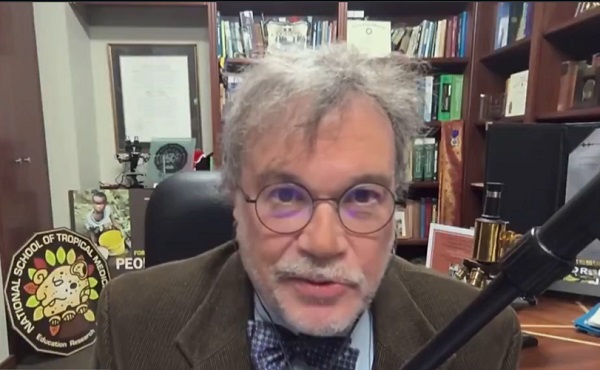Health
Dr. Peter Hotez predicts rampant spread of diseases once Trump takes office

From LifeSiteNews
Dr. Peter Hotez says it will be ‘dangerous’ if the Senate confirms Robert F. Kennedy Jr. as the Secretary of Health and Human Services.
Prominent “vaccine scientist” Dr. Peter Hotez issued an eerie warning during an interview this week, listing a litany of diseases that may begin to spread starting on January 21, President-elect Donald Trump’s first full day in office.
Speaking with Nicole Wallace on MSNBC’s Deadline White House about how supposedly “dangerous” it would be for the country if the Senate confirms Robert F. Kennedy Jr. as Secretary of Health and Human Services (HHS), Hotez began warning of diseases that will start to spread on January 21 while slamming vaccine skeptics. Hotez has a long history of attacking “anti-vaxxers” who have raised legitimate concerns about COVID and other vaccines.
“We have some big picture stuff coming down the pike starting on January 21. Mr. (Mike) Bloomberg mentioned H5N1 that I’m really worried about,” Hotez said. “It’s all over wild birds on the western part of the United States and going up in the north. It’s getting into the poultry, we’re seeing sporadic human cases, no human-to-human transmission yet, but that could happen. It’s in the cattle, it’s in the milk. And that’s just the beginning.
“We have another major coronavirus likely brewing in Asia; we’ve had Sars in 2002, Sars2, COVID-19 in 2019. And we know these viruses are jumping from bats to people thousands of times a year.”
“But there’s still more; we know that we have a big problem with mosquito-transmitted viruses all along the Gulf Coast. Where I am here in Texas, we’re expecting dengue and possibly Zika virus coming back or Oro Pouche virus, maybe even yellow fever, and there’s more. Then we have this sharp rise in vaccine-preventable diseases going up because, in part, the anti-vaccine activists,” Hotez said.
The scientist then reiterated that we might start to see these outbreaks on January 21 under the new Trump administration.
“All that’s gonna come crashing down on January 21st on the Trump administration. We need a really, really good team to be able to handle this,” Hotez said.
There have been several responses to Hotez’s strange comments, including by cardiologist and leading COVID establishment critic Dr. Peter McCullough, who said during an appearance on Live from Studio 6B on Real America’s Voice that Hotez and “vaccine lobbyists” are pushing an “agenda of fear.”
“To lay it down and say it’s all gonna happen the day Trump takes office, you can tell what the agenda here is. There’s an agenda of fear being pushed by the vaccine lobbyists to constantly keep Americans in fear about the next viral threat so they can hold power and because they know in their minds that the only thing they’ll offer is more vaccines,” McCullough said.
LifeSite reached out to Hotez, asking him to clarify exactly what he meant by his comments, but has yet to receive a response.
However, he did offer a response to the backlash from his statements on X, saying his comments were being misinterpreted by “extremist media.”
“(I) outlined the tough infectious disease challenges the Trump appointees will face and inherit when they begin in January. They twisted it to claim we will launch new viruses at them, as totally ridiculous as that sounds,” Hotez wrote.
Hotez was a major proponent of the COVID vaccines and has slammed vaccine skeptics. In a 2022 World Health Organization (WHO) video about “misinformation” surrounding the COVID vaccine, he called those who had concerns about the vaccine a major killing force.”
Last year, after an appearance by RFK Jr. on Joe Rogan’s podcast in which they discussed his concerns over vaccines, Hotez blasted them for “misinformation” in an X post. His post prompted Rogan to challenge him to debate RFK Jr. on his show. While RFK Jr. agreed to the debate, Hotez never responded.
Health
News RFK Jr.’s vaccine committee to vote on ending Hepatitis B shot recommendation for newborns

From LifeSiteNews
The goal is to examine whether vaccines on the recommended schedule are contributing to the rise in allergies, autoimmune diseases, and other conditions such as autism.
Vaccine advisors to Department of Health and Human Services Secretary Robert F. Kennedy Jr. plan to vote on ending the recommendation of the Hepatitis B shot for infants and discuss other changes to the childhood vaccination schedule.
The federal advisers, selected by RFK Jr., will meet on Thursday and Friday to review the childhood vaccination schedule, according to a report from The Washington Post. The goal is to examine whether vaccines on the recommended schedule are contributing to the rise in allergies, autoimmune diseases, and other conditions such as autism.
The vaccine panel, headed by Kirk Milhoan, a pediatric cardiologist and critic of the COVID shots, plans to vote on ending the Hepatitis B vaccine recommendation for infants within 24 hours of birth. The panel will decide whether to delay the first dose to a later time.
Critics of the very early administration of the first Hepatitis B vaccine dose argue that it represents an unnecessary risk, as the vast majority of children are not at risk of infection.
The vaccine committee makes recommendations to the CDC director on the vaccine schedule. Directors have typically adopted the panel’s recommendations, compelling insurers to cover certain vaccines. These recommendations also provide a guideline for most pediatricians and medical organizations.
READ: Florida moving to be first state to end all childhood vaccine mandates
“We’re looking at what may be causing some of the long-term changes we’re seeing in population data in children, specifically things such as asthma and eczema and other autoimmune diseases,” Milhoan told The Washington Post.
“What we’re trying to do is figure out if there are factors within vaccines,” he added.
He said that the committee is examining the potential dangers of using aluminum as an adjuvant, an ingredient meant to trigger an immune response strong enough for the body to develop antibodies and protect the person from the disease.
RFK Jr.’s panel has been heavily criticized by establishment health organizations and the pharmaceutical industry. Big Pharma officials have said that removing aluminum from vaccines and replacing it with another adjuvant would cost billions of dollars and take years.
The CDC recently revised its website on the issue of autism and vaccines, now stating, “The claim ‘vaccines do not cause autism’ is not an evidence-based claim because studies have not ruled out the possibility that infant vaccines cause autism.” The CDC had previously held that there was definitely no link between vaccines and autism. The change was made at the direct order of RFK Jr.
The McCullough Foundation, founded by famous cardiologist and COVID response critic Dr. Peter McCullough, goes even further in its critique of childhood vaccines. In a recent extensive report, the authors analyzed 12 studies comparing routinely vaccinated with unvaccinated children. According to the report, all of these studies showed “superior overall health outcomes among the unvaccinated, including significantly lower risks of chronic medical problems and neuropsychiatric disorders such as ASD [Autism spectrum disorder].”
Health
23,000+ Canadians died waiting for health care in one year as Liberals pushed euthanasia

From LifeSiteNews
Tens of thousands of Canadians have died while on waitlists in recent years, according to new data. Meanwhile, euthanasia now accounts for five percent of all deaths in Canada.
Over 23,000 Canadians have died while on waitlists for medical care as Liberals focused on euthanasia expansions.
According to government figures published on November 26 by Canadian think tank SecondStreet.org, 23,746 patients died on government waiting lists for health care between April 2024 and March 2025.
“What’s really sad is that behind many of these figures are stories of patients suffering during their final years – grandparents who dealt with chronic pain while waiting for hip operations, people leaving children behind as they die waiting for heart operations, so much suffering,” SecondStreet.org President Colin Craig explained.
“It doesn’t have to be this way. If we copied better-performing European public health systems, we could greatly reduce patient suffering,” he continued.
According to the data, collected through Freedom of Information (FOI) requests, there has been a three percent increase of deaths while on waitlists compared to last year. The number is likely much higher, as the reports did not include figures from Alberta and some parts of Manitoba.
Data further revealed that 100,876 Canadians have died while waiting for care since 2018, thanks to increased wait times and insufficient staffing.
“It’s interesting that governments will regularly inspect restaurants and report publicly if there’s a minor problem such as a missing paper towel holder,” Craig noted. “Meanwhile, no government reports publicly on patients dying on waiting lists. It’s quite hypocritical.”
At the same time, the Liberal government has worked to expand euthanasia 13-fold since it was legalized, making it the fastest growing euthanasia program in the world. Meanwhile, Health Canada has released a series of studies on advance requests for assisted suicide.
As LifeSiteNews reported earlier this week, so-called “Medical Assistance in Dying” (MAID) is responsible for five percent of all deaths in Canada in 2024.
At the same time, internal documents from Ontario doctors in 2024 that revealed Canadians are choosing euthanasia because of poverty and loneliness, not as a result of an alleged terminal illness.
Currently, wait times to receive genuine health care in Canada have increased to an average of 27.7 weeks, leading some Canadians to despair and opt for assisted suicide instead of waiting for medical aid. At the same time, sick and elderly Canadians who have refused to end their lives have reported being called “selfish” by their providers.
In one case, an Ontario doctor revealed that a middle-aged worker, whose ankle and back injuries had left him unable to work, felt that the government’s insufficient support was “leaving (him) with no choice but to pursue” euthanasia.
Other cases included an obese woman who described herself as a “useless body taking up space,” which one doctor argued met the requirements for assisted suicide because obesity is “a medical condition which is indeed grievous and irremediable.”
The most recent reports show that euthanasia is the sixth highest cause of death in Canada. However, it was not listed as such in Statistics Canada’s top 10 leading causes of death from 2019 to 2022.
-

 Alberta2 days ago
Alberta2 days agoThis new Canada–Alberta pipeline agreement will cost you more than you think
-

 Energy2 days ago
Energy2 days agoUnceded is uncertain
-

 Automotive2 days ago
Automotive2 days agoPower Struggle: Governments start quietly backing away from EV mandates
-

 Business20 hours ago
Business20 hours agoCanada’s climate agenda hit business hard but barely cut emissions
-

 Energy1 day ago
Energy1 day agoCanada following Europe’s stumble by ignoring energy reality
-

 MAiD1 day ago
MAiD1 day agoFrom Exception to Routine. Why Canada’s State-Assisted Suicide Regime Demands a Human-Rights Review
-

 Great Reset2 days ago
Great Reset2 days agoCanada’s MAiD (State Sanctioned Murder) Report Just Dropped
-

 Business1 day ago
Business1 day agoCarney government should privatize airports—then open airline industry to competition




